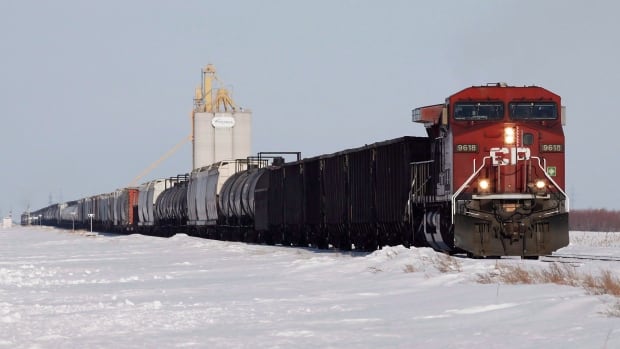
Canadian Pacific Railway shutdown 'one more nail in the coffin' for Manitoba businesses: advocates
CBC
As the Canadian Pacific Railway shuts down over a labour dispute, Manitoba agriculture and manufacturing organizations are calling on the federal government to intervene to avert a possible death blow to businesses.
The Teamsters Canada Rail Conference, which represents some 3,000 engineers, conductors, yard workers, and other train employees, issued a release just before midnight Sunday, saying a lockout was being initiated by management at the Calgary-based railway.
But hours later the company put out a release stating that while the company was still engaged in contract talks facilitated by federal mediators, the TCRC "withdrew its services and issued a news release misrepresenting the status of the talks." It added that CP was working with its customers to wind down its operations across Canada.
Ron Koslowsky, the Manitoba vice president of Canadian Manufacturers and Exporters, says any kind of work stoppage is a punishing blow to businesses after the COVID-19 pandemic, weather disruptions, the trucker convoy and the ongoing war in Ukraine.
"On top of everything else, the last thing we needed was yet one more nail in the coffin so to speak, and the rail strike or the potential strike coming up on the weekend, we just can't believe that this is happening," he said.
"This is our lifeblood, the movement of goods and inputs of goods back and forth. And it strangles the jobs, it constricts the arteries of our business and the wealth, ultimately, of our country."
CP Rail issued a 72-hour notice on Wednesday to the Teamsters Canada Rail Conference of its plan to lock out almost 3,000 employees on Sunday, if the union and the company can't come to a settlement or agree to binding arbitration.
However on Thursday, CP Rail said it received strike notice from the union representing its engineers, conductors and other train employees.
The two sides are at odds over 26 outstanding issues, including wages, benefits and pensions.
But Koslowsky believes another side must step in to avoid further supply chain issues — government.
"We feel the governments at all levels, but certainly the federal government, as it relates to borders or rail lines, must jump in to make sure that this thing does not become a problem, that does not lead to a disruption of service, whatever that takes," he said.
For the manufacturers and exporters he represents, railways are key to staying in business because 50 per cent of manufactured goods are transported by train.
Any kind of work stoppage or labour action also has Manitoba farmers worried, according to Chuck Fossay, the director of grains, oilseeds and pulses with Keystone Agricultural Producers.
Fossay, who farms outside of Starbuck, Man., is calling on the federal government not to delay in intervening in the labour dispute.













